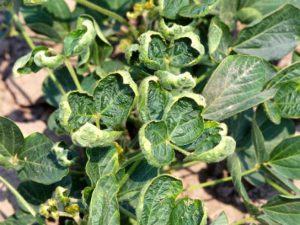 The White House administration reached a new deal with three of the major agribusiness companies for labeling requirements, which remain voluntary, for the controversial herbicide dicamba that has been blamed for hurting crops.
The White House administration reached a new deal with three of the major agribusiness companies for labeling requirements, which remain voluntary, for the controversial herbicide dicamba that has been blamed for hurting crops.
On Friday the Environmental Protection Agency made an announcement of its agreement with BASF, DuPont, and Monsanto regarding applying dicamba, which controls weeds in fields that have genetically modified soybeans and cotton.
Farmers that do not buy the seeds that are especially resistant sold by makers of herbicides have made complaints that the dicamba sprayed on properties near them drifts to their farms and harms crops, which resulted in a ban temporarily issued during the summer by Missouri and Arkansas state officials.
Under this deal, dicamba products are to be labeled as having “restricted use” starting with the growing season of 2018, requiring more training and certifications for farm workers who will be applying it to crops.
The updated rules will limit when as well as how the herbicide is able to be sprayed, such as the time of day as well as only when the maximum winds are below 10 mph.
Farmers are to be required to keep specific records that show their compliance to the new restrictions.
The EPA also said that labels could be looked at again in 2019, when the current registration by the federal government allowing dicamba sales in the U.S. comes up for review.
On Friday, Monsanto said that it proposed voluntary changes in labels, which the EPA then accepted.
In a prepared statement DuPont said it was appreciative of how the EPA and industry worked together in establishing the latest guidelines.
For decades, dicamba has been used, but problems increased of late as farmers started to plant new engineered seeds resistant to the herbicide.
Since dicamba easily evaporates once applied, it can drift with the wind into other fields nearby. Some farmers illegally sprayed the herbicide prior to federal regulators approving the new versions that have been promised to be less volatile.
The herbicide is suspected as well as being a factor in the killing of a soybean farmer in Arkansas who allegedly had been shot by worker from a farm nearby where dicamba was sprayed.
The farm worker was accused of shooting and killing Mike Wallace, a 55 year old farmer, during a confrontation, in which Wallace said that dicamba had drifted onto his farm thus damaging his soybeans.
